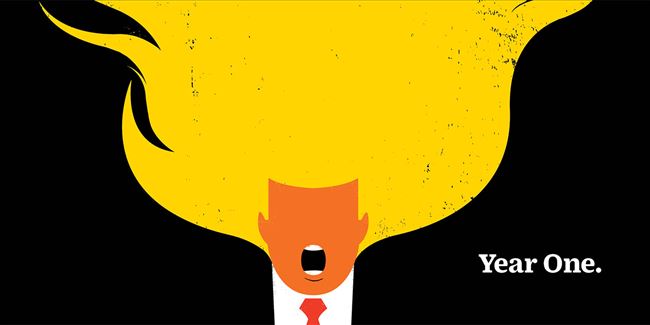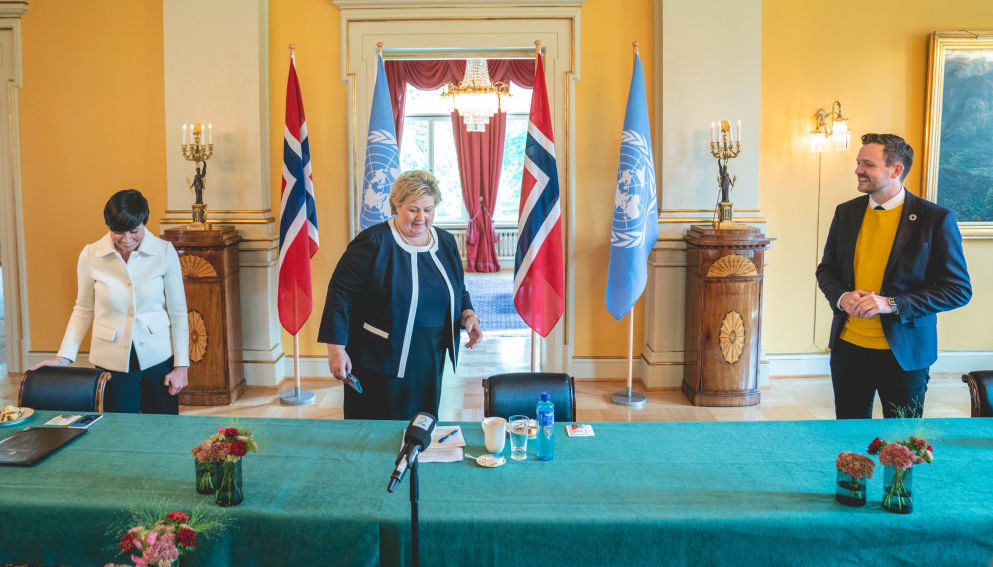Clodagh Harrington, De Montfort University
Anyone looking for a visual representation of Donald Trump’s first year in office need only behold Time magazine’s cover marking the anniversary. Composed by artist Edel Rodriguez, it depicts Trump as a furious, bellowing mouth, his notorious hair rendered in livid flames.
For a year of poisonous rhetoric backed up with few substantial achievements, it could scarcely be more apt. Without even a glance at a policy checklist, the most casual observer knows that Trump has torn up the presidential rule book and set the shreds on fire.
Year One. My new cover for TIME magazine, on newsstands today.
art: @edelstudio pic.twitter.com/3Pd9aSkeZU— Edel Rodriguez (@edelstudio) January 11, 2018
Ever since the Kennedy era ushered in the personalised presidency, scholars of US politics have cautioned their students to beware of the shiny distractions that take up the news agenda and focus on the substance of what the executive branch is doing – the most meaningful business is often done in the shadows. But, then again, rhetoric is a powerful tool of the executive. A president’s words – and tweets – really matter.
Trump has spent the past two-and-a-half years crafting a political style which, when distilled, consists of little more than catchy soundbites and incandescent tweets. Detractors might scorn his freewheeling (to put it politely) verbal style, but from the start of his campaign, he energised his supporters in a way that his Democratic opponent could only dream of – and all while giving only the sketchiest details of how he planned to achieve anything once elected.
But, on the campaign trail, a candidate can be forgiven for lacking substance – in fact, it may be an advantage. As far as campaigns go, substance can be hard to sell – Hillary Clinton was roundly mocked for offering dull, wonky stump speeches demonstrating her grasp of complex policy problems. The Make America Great Again mantra, on the other hand, was a stroke of Reaganesque genius, vague enough that voters could read into it whatever they liked.
Governing, though, is another matter. Trump has not shifted American public opinion on any given issue, and nor has he tried. Instead, he has focused on gratifying his tribal base.
Don’t look too hard
For now at least, the 39-40% of voting Americans who still approve of him appear satisfied with the president and his “America First” rhetoric, despite his administration’s paucity of meaningful achievements. To the extent Trump had a plan, this is in keeping with it. As presidential scholar George Edwards has detailed, Trump came to office with a powerful slogan and even some goals, but no discernible strategy.
To the extent he has pursued a coherent agenda, he has focused on rolling back Obama-era achievements, but to little avail. Most conspicuously, he has failed to repeal Obamacare, which the Republican party has been promising to dismantle more or less since it was passed.
Instead of mastering the art of dealing with Congress, Trump has followed Obama’s late term example and used executive actions to fast-track some of his most dramatic priorities. Again, it was a triumph of style. The substance of these often single-page documents was generally wafer thin, and some (the travel ban included) were blocked by the courts. The sight of him signing away in his early Oval Office days reassured to his voters that their leader was firmly in control, fearlessly implementing an agenda that ticked the conservative boxes.
As journalist Selana Zito put it in the Atlantic, liberals continue to take him literally but not seriously, while his supporters take him very seriously but not literally. Reflecting on what Trump has achieved to date, perhaps the most consequential aspect of his first year is that he has energised those who view their county and the world through an “America First” lens – with the dark connotations that this brings.
Despite his insistent cries of “I am not a racist”, his language has been at best unpresidential, at worst, divisive and race-baiting. Either way, he has provided oxygen and succour to those with a white nationalist agenda. That is a toxic achievement by any measure.
![]() Whether he cares about these consequences is another matter. One year into his reign, it’s clear that for the 45th US president, style is substance. His greatest skill and top priority is to keep the spotlight – however unflattering – firmly on himself.
Whether he cares about these consequences is another matter. One year into his reign, it’s clear that for the 45th US president, style is substance. His greatest skill and top priority is to keep the spotlight – however unflattering – firmly on himself.
Clodagh Harrington, Senior Lecturer in Politics, De Montfort University
This article was originally published on The Conversation. Read the original article.





There are 2 comments
Comments are closed.